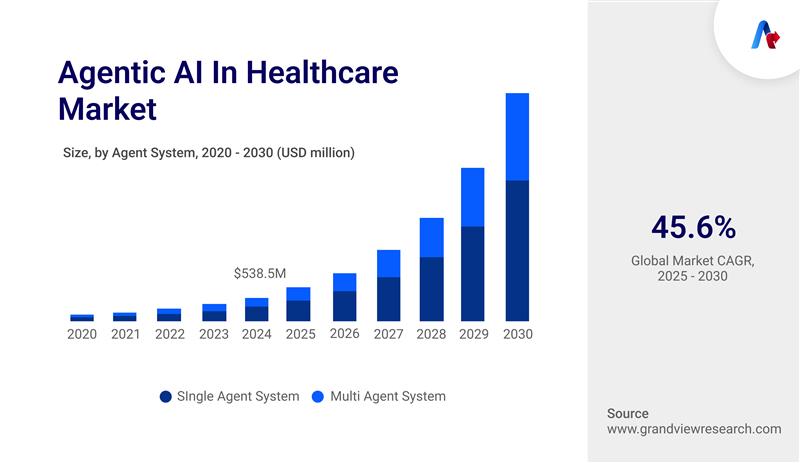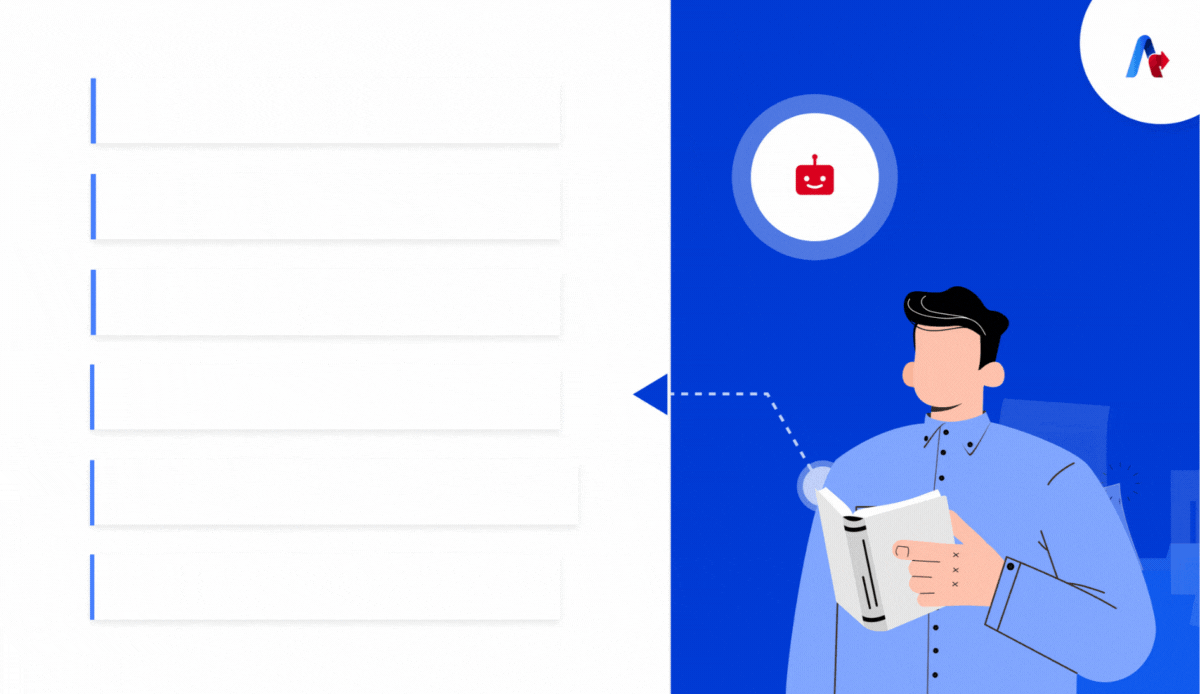Agentic AI in healthcare
BLOG
10 min read
How Agentic AI is Transforming Healthcare: Benefits & Use Cases
What if your healthcare system anticipated issues and took action before they even emerged, rather than only reacting to them?
With the advent of agentic AI, that is the path we are on. Though they already power everything from virtual assistants to predictive diagnostics, classic AI models like machine learning, deep learning, natural language processing (NLP), and computer vision are mostly useful for certain, predetermined tasks in the healthcare industry.
But agentic AI takes things to the next level.
Agentic AI systems don't wait for commands; instead, they act freely, making judgments and acting on behalf of care teams based on contextual knowledge and real-time data. With agentic automation, healthcare businesses can improve patient care delivery, make faster decisions, and streamline their workflows.
These intelligent agents are made to help healthcare professionals remain ahead of the game, especially in high-stakes settings like intensive care units or emergency rooms. Whether that is arranging follow-ups, modifying treatment plans, or starting emergency interventions, agentic AI is a complete support.
What is Agentic AI in Healthcare?
In the healthcare industry, “agentic AI” refers to AI systems operating independently, making choices, and behaving according to objectives without continual human supervision. These systems are made to be proactive agents by evaluating patient data, forecasting results, and starting care procedures like follow-up appointments or treatment plan modifications.
Agentic AI boosts productivity, aids in clinical decision-making, and improves patient outcomes in various healthcare settings by operating autonomously but ethically by medical rules.
What Kind of AI is Used in Healthcare?
The healthcare sector uses a variety of AI models, like computer vision, natural language processing (NLP), deep learning, and machine learning. These models support activities like virtual assistance, administrative automation, predictive diagnoses, and image analysis.

Agentic AI in healthcare, however, goes further. It enables systems to not only understand facts but also take action by fusing goal-oriented reasoning with independent decision-making. Imagine an AI that not only notifies a physician of a problem but also plans follow-up appointments, suggests modifications to treatment, and actively oversees the patient's care trajectory.
In high-stakes situations when prompt judgments might save lives, such as emergency rooms or intensive care units, this progression is especially important. Because agentic AI is built on real-time data and contextual knowledge, healthcare professionals can rely on intelligent systems to prioritize patient requirements, allocate resources dynamically, and even start time-sensitive interventions.
Want to implement Agentic AI in your organization?
Talk to our healthcare automation expertsBenefits of Agentic AI in Healthcare
By providing intelligent automation solutions that go beyond basic automation, agentic AI for healthcare is changing the sector's clinical and operational facets. Care delivery will be more responsive and effective as a result of these AI agents' ability to learn from data, set objectives, and act on their own. Here are a few of the main advantages:
Autonomous Decision-Making
The capacity of agentic AI to behave without continual human supervision is among its most revolutionary features. AI agents can make judgments based on existing patient data and established protocols, whether they are modifying treatment plans, setting up follow-up appointments, or starting diagnostic tests.
As a result, healthcare professionals are less burdened and get more time to connect with patients to make important decisions.
Personalized Patient Care
To create personalized care plans, agentic systems continuously examine a patient's genetic information, lifestyle choices, medical history, and treatment results. Due to this dynamic approach, therapy can be now customized in real-time rather than being one-size-fits-all, which enhances clinical results and patient satisfaction.
Proactive Health Management
Agentic AI makes preventive care possible rather than responding to symptoms after they appear. It can identify early warning indicators and start treatments before an illness worsens by examining vital signs, behavioral data, and trends. It is particularly helpful for post-operative care and managing chronic diseases.
Streamlined Administrative Processes
Agentic AI greatly enhances administrative tasks in addition to providing therapeutic help. In order to reduce paperwork and free up people for higher-value duties, AI agents can handle appointment scheduling, insurance verification, patient onboarding, billing, and even documentation.
“A study by Salesforce revealed that AI agents can reduce paperwork by 30%.”
Improved Accuracy
As agentic AI systems use a vast amount of historical and real-time data, they are able to make extremely accurate suggestions for diagnosis and therapy. They keep learning from every new piece of information, which lowers the possibility of human error and promotes evidence-based medical judgment.
Top Use Cases of Agentic AI in Healthcare

What are some examples of agentic AI's practical uses in the medical field? As agentic systems gain speed, they are being integrated into numerous domains throughout the healthcare spectrum. In addition to automating tasks, these intelligent agents comprehend goals, make context-aware decisions, and execute them with little assistance from humans.
Here are some top use agentic AI use cases in healthcare:
Chronic Disease Management
Chronic conditions including diabetes, heart disease, and asthma have to be managed with ongoing observation and prompt action. Agentic AI systems regularly examine patient data from wearables, daily health diaries, and medical records in order to identify early indicators of decline.
When proactive action is required, these AI agents can call patients or care teams, modify treatment regimens, and suggest lifestyle modifications on their own, improving results and lowering hospitalization rates.
Virtual Health Assistants
Agentic AI-powered virtual health assistants are far more sophisticated than simple chatbots and interact with patients in individualized, natural ways. In addition to answering health-related inquiries and providing medical information, these agents also schedule appointments, remind patients to take their medications, start follow-up procedures, and report issues to doctors.
They improve patient participation and adherence to care plans by acting as digital caretakers who are always on.
Clinical Trial Optimization
Managing patient recruiting, compliance, and data keeping is frequently necessary to run successful clinical research. It is made easier by agentic AI, which manages informed consent, tracks trial progress, and automatically finds qualified volunteers through EHR (Electronic Health Record) analysis.
Additionally, it has the ability to instantly modify protocols in response to participant responses, which lowers dropout rates and speeds up the adoption of novel treatments.
Hospital Workflow Automation
Through the management of complex medical logistics, agentic AI increases operational efficiency. In scheduling surgeries around the availability of personnel, agents manage room assignments in real-time according to patient priorities while guaranteeing that all resources, including equipment and drug stocks, are used optimally.
A report by Accenture claims that agentic AI can save up to $50 billion annually for the healthcare industry.
By pre-emptively resolving bottlenecks and reallocating resources, Agentic AI ensures that the hospital ecosystem runs smoothly.
Remote Patient Monitoring and Home Care
As telemedicine and home-based care continue to gain popularity, agentic AI is indispensable in remotely monitoring patients' health. These systems fetch information from a mobile application, wearable tech, and home sensors, and then autonomously act on that information.
They can, for example, set up a virtual consultation, notify patients when it's time to take their medications or call for help when vital signs rise above acceptable levels. It guarantees continuous care delivery, particularly for older or high-risk patients.
Personalized Preventive Care
Able to spot health risks long before they become serious to mitigate long-term effects on health and promote well-being, agentic AI excels in this sort of work. Integrating genetic factors, lifestyle choices, environmental exposures, and real-time health metrics, these systems will develop personalized preventive care plans, including wellness routines, vaccination schedules, mental health check-ins, and dietary recommendations.
Key Considerations and Challenges of Implementing Agentic AI in Healthcare
Agentic AI offers great potential for healthcare. However, its realization brings with it a unique set of disruptions. Autonomously deciding systems need to be introduced with plenty of consideration, regulation, and continuous evaluation in sensitive, high-stakes contexts like healthcare.
The following would be among the key issues and concerns confronting healthcare institutions:
Data Privacy and Security
Agentic AI systems need to have access at all times to huge reservoirs of sensitive patient data including outcomes of tests, data from wearable devices, genetic information, electronic health records, and much more. With regard to privacy, this stipulates a serious concern. All healthcare suppliers must implement data protection regulations comprehensively, such as in the case of GDPR in the EU and HIPAA in the U.S.
Regulatory Hurdles
Agentic AI finds itself frequently subjected to more stringent regulatory surveillance than its conventional healthcare tools, given its capacity for autonomous decision-making. To be granted endorsement by medical regulatory agencies such as the FDA, clinical trials, robust validation, and an explanation of the AI's decision-making rationale would be warranted.
Bias and Fairness
AI systems perform better when trained on representative data. Conversely, if the datasets used for training are biased, this will result in AI systems producing biased outputs that can result in health inequities along lines of age, gender, or ethnicity.
Human Oversight and Accountability
While agentic AI may increasingly become very competent, human oversight should still come into play. The control exercise must remain with health professionals
Interoperability with Existing Systems
EMRs, diagnostic software, appointment platforms, and billing tools are just a few of the IT systems that healthcare providers frequently employ. It can be technically challenging to integrate agentic AI for healthcare with these outdated systems.
Let our team show you how Agentic AI can transform your healthcare operations.
Contact us today for a free consultationHow Agentic AI is Shaping the Future of Healthcare
The ability of intelligent systems to act independently, adjust to real-time data, and assist patients and doctors is what is transforming the future of healthcare through agentic AI. These AI agents are actively participating in the delivery of better, more proactive healthcare, from individualized treatment and quicker diagnostics to intelligent decision-making and operational efficiency.
- Enables real-time and personalized patient care
- Supports faster and smarter clinical decisions
- Automates routine administrative tasks for healthcare organizations
- Enhances chronic disease monitoring and management
The role of technology will only grow as it develops, bringing us one step closer to a healthcare system that is more patient-centered and responsive.
Agentic AI in healthcare is the future for growth and with agentic automation companies like Accelirate, you can speed up this process. Our experts will guide you right from the start for quick and reliable integration.
FAQs
Agentic AI is changing healthcare by automating decision-making, enhancing patient care via predictive analytics, and streamlining administrative processes for increased operational effectiveness.
Agentic AI has practical uses in healthcare, including patient monitoring, individualized treatment suggestions, autonomous diagnosis, and simplifying administrative duties like scheduling and accounting.
While traditional AI usually needs human oversight for decision-making, agentic AI in healthcare can make decisions on its own and act in real-time.
Yes, using agentic AI in healthcare poses compliance issues, especially regarding protecting patient privacy, adhering to legal requirements, and preserving openness in AI decision-making.
Yes, agentic AI can interact with hospital or EHR systems to improve data analysis, decision-making, and workflow automation without interfering with the current infrastructure.


